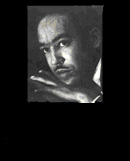|
He writes, in the same essay, "I am ashamed for the black poet who says,I want to be a poet, not a Negro poet,' as though
his own racial world were not as interesting as any other world." For Hughes, who wrote honestly about the world into
which he was born, it was impossible to turn away from the subject of race, which permeated every aspect of his life, writing,
public reception and reputation. That said, his subject matter was extraordinarily varied and rich: his poems are about music,
politics, America, love, the blues, and dreams. No list could be inclusive enough. Hughes wrote poems about ordinary people
leading ordinary lives, and about a world that few could rightly call beautiful, but that was worth loving and changing. Unfortunately,
as with many of our great American poets (Emily Dickinson, Robert Frost), the variety and challenging nature of his work has
been reduced in the public mind through the repeated anthologizing of his least political, most accessible work. His most
famous poem, "Dreams," is to be found in thousands of English textbooks across America. Memorized by countless children
and adults, "Dreams&" is among the least racially and politically charged poems that he wrote:
Hold fast to dreams
For if dreams die
Life is a broken-winged bird
That cannot fly.
Hold fast to dreams
For when dreams go
Life is a barren field
Frozen with snow.
In his poem it means that if your dreams are shattered you are like a bird with a broken wing.
Langston Hughes intro.
Though this is a poem of hope, it seems significant that he writes, in the second stanza, "when" instead of "if,"
a testimony to the difficulty of his own life, and the lives he so closely observed in his work. A later poem, "Dream
Variations," articulates that very dream and is only slightly less well-known, or known primarily because of the last
line, which became the title of John Howard Griffin's seminal work on race relations in the sixties.
To fling my arms wide
In some place of the sun,
To whirl and to dance
Till the white day is done.
Then rest at cool evening
Beneath a tall tree
While night comes on gently,
Dark like me-
That is my dream
To fling my arms wide
In the face of the sun,
Dance! Whirl! Whirl!
Till the quick day is done.
Rest at pale evening . . .
A tall, slim tree . . .
Night coming tenderly
Black like me.
This Poem means that the real you is hidden real deep inside of your heart.
Langston Hughes Poems
|



